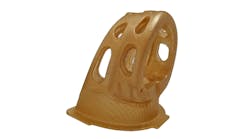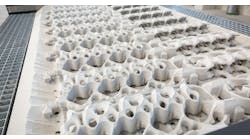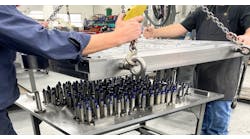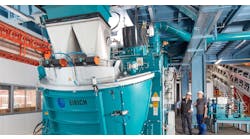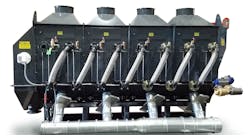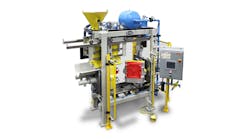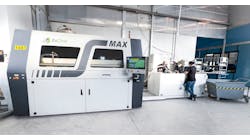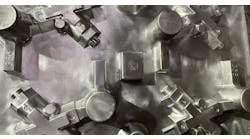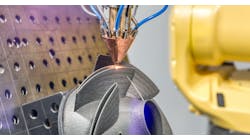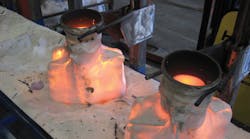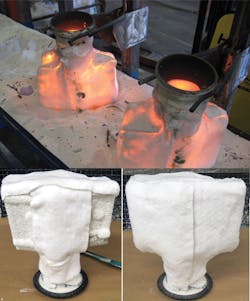Latest from Molds/Cores
For Investment Casting, an Efficient, Effective and Environmentally Sound Insulator
Investment casting has been widely adopted by the builders of engines for aerospace, automotive, and industrial power generation, who lately have confronted a new operating challenge: many of the foundries producing the investment castings needed for these products use refractory ceramic fiber (RCF) as thermal insulation. However, RCF has been affected by stricter regulations in the European Union, so foundries in the region have had to identify alternative insulation materials, in particular for use as mold wraps.
Morgan Advanced Materials, which has worked with many of those foundries in past product development efforts, collaborated with one engine OEM and an investment casting foundry to develop a new series of low bio-persistent alkaline earth silicate (AES) wool insulation that can replace RCF in the casting of gas turbine blades.
Recent casting trials have confirmed that using AES during product manufacturing achieves comparable heat-containment results as RCF mold wrap and that there are no other detrimental effects if RCF is substituted with AES. Following these trials, the conversion process was completed and both companies are using Morgan’s Superwool® HT Blade Wrap in mold wrap applications.
Using superalloys to manufacture critical high-precision castings for aerospace and industrial gas turbine (IGT) manufacturing has increased dramatically in recent decades, because their temperature capabilities allow turbines to run hotter and more efficiently, thereby reducing fuel consumption.
Mold wrap is an essential part of thermal process control for investment casting for superalloy parts production. It is used to insulate the pre-heated mold, ensuring efficient mold fill, and to provide controlled cooling during the critical solidification of the metal.
High-temperature insulating wool (HTIW) blankets, with carefully controlled specifications, are the normal choice for mold wraps. It provides thermal shock resistance, low thermal mass, and a fibrous structure that makes it highly insulating at high temperature.
Traditionally, most aerospace and IGT casting processes have used blown RCF blanket. However, such products have been classified hazardous by the European Union and are strictly regulated. In addition, under the EU REACH (Registration, Evaluation and Authorization of Chemicals) regulation, RCF has been proposed for inclusion among the list of chemicals that may require an authorization covering the mold wrap application. The changing nature of RCF classification creates uncertainty about future availability and use of these products.
As a result of the increasing regulation and resulting uncertainty, a number of companies have been developing non-RCF alternatives. Once proven to meet the high-temperature needs of investment casting applications, such alternatives can replace RCF and remove the risk of a future break in supply.
Morgan Advanced Materials has developed alternative HTIW materials with excellent high-temperature insulating performance that also offer low bio-persistence, thereby avoiding classification as a carcinogen. These fibers, sold as Superwool® brand products, have been exonerated from carcinogen classification in Europe under the provisions of Note Q of European Directive 97/69/EC (adapting Council Directive 67/548/EEC).
Superwool HT Blade Wrap was designed to achieve insulating characteristics equivalent to those previously achieved with RCF mold wrap, and so are readily available as a substitute.
The OEM and the investment casting foundry considered using RCF to be a “business continuity” risk, based on the uncertainty surrounding the classification. As a result, they decided to transition from RCF for investment casting applications, including the production of turbine blades, starting with an investigation of alternative practices.
Working with Morgan as their primary development partner, the two companies began a project to pursue use of high-temperature AES as the alternative to RCF. Much of the work was carried out for the aerospace business they supplied, which requires castings with equiaxed or randomly orientated grain structures, using the mold wrap to control the cooling process. The manufacturers required a consistent, thin blanket product with sufficient mechanical strength to be manipulated around complex molds and provide equivalent thermal insulation.
Morgan conducted casting trials using its Superwool® HT, the highest classification temperature AES fiber commercially available (1,300˚C). In the blanket form, the material is 6-13 mm thick with 128 kg/m3 density. Its advanced low bio-persistence fiber manufacturing technology significantly lowers shot content, improving insulation performance and handleability.
The first phase of casting trials on a range of aerospace and IGT products within the engine manufacturer’s foundry confirmed that the castings are manufactured to the same quality standards and exhibit no detrimental effects compared to castings made using RCF mold wrap. The trials determined that the insulation can accommodate the high temperatures required during the mold pre-heat stage while retaining mechanical integrity. The Superwool HT also offers the advantage of not being on the limit of current pre-heat temperatures, allowing the flexibility to increase the temperature further if required.
Subsequent testing measured thermal gradients inside pre-heated molds as they cool to compare the RCF to the Superwool HT wrap materials. Two thermocouples were positioned on the legs of the mold, and then loaded into a furnace held at 1,050°C. The temperature was monitored using a data logger and the mold allowed to soak for five minutes once it reached temperature. Then, the mold was removed and allowed to cool while the temperature continued to be logged. These experiments allowed the selection of the optimum specification of Superwool HT material.
Next the researchers conducted metal-filled mold trials in the foundries and determined the effects on metallurgy. Those results confirmed that Superwool HT material compared favorably to the existing RCF mold wrap product.
Now, both manufacturers have transitioned to using Superwool HT Blade Wrap.
Dr. Craig Freeman is the research and development manager for Morgan Advanced Materials.
